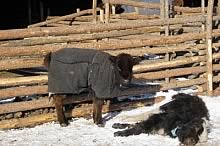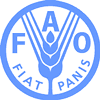 |
|||||||||
|
|||||||||||||||||||
|
|
Dire Winter Triggers Livestock Disaster in Mongolia 2010-02-02 Temperatures plunging to -50°C have killed 1.7 million head of livestock in Mongolia, threatening the livelihoods of 21 000 herder families and putting them at risk of food insecurity, FAO warned today.
A spell of intense cold, with temperatures plummeting to minus 40-50°C followed a very dry and long summer and autumn which produced insufficient fodder to feed livestock during the winter months. Such extreme weather is known locally as a Dzud. More deaths feared The ongoing Dzud has resulted in huge livestock losses, with 1.7 million deaths counted as of 31 January. If current conditions persist, the government estimates that losses could reach 3-4 million head of livestock by spring. One third of the population of Mongolia lead nomadic lives and depend entirely on livestock for a living. Their cattle, sheep, goats, horses and camels are the main household asset and are perishing from cold, exhaustion or starvation. Total economic losses so far are estimated at $62 million. Also, substantial numbers of wildlife are dying. Fourteen of Mongolia’s 21 provinces are considered seriously affected. According to the FAO assessment mission, in eight provinces 21 000 herder families owning between 100 and 300 head of livestock each have lost more than 50 percent of their herds. Food insecurity The affected families face increased levels of food and livelihood insecurity as their cash income rapidly declines and prices of fodder climb sharply compared to last year. If assistance is not provided soon, the mission warned, spreading poverty will lead to mass migration to the cities later this year. The FAO mission stressed the urgent need to strengthen household food security for the most vulnerable families to prevent further loss of their assets, and proposed immediate livestock input support for the most vulnerable herders as a top priority. In parallel, fodder, supplementary feed and veterinary care is urgently needed for weak and stressed animals until mid-April, with funding requirements of $6 million. Detailed project profiles are under preparation for submission to donors. Medicinal supplement FAO's Animal Production and Health Commission for Asia and the Pacific has provided 5 000 doses of medicinal food supplement for dairy cows, pregnant heifers and young bulls as immediate assistance. Medium-term interventions should focus on disaster preparedness and risk reduction plans and strategies, and FAO is ready to provide assistance to the country as required. Mongolia covers an area of 1.6 million square kilometers, an area roughly the size of Western Europe.
|
||||||||||||||||||

|
|
||||||||||||||||||
| home | agri-services | pedigree
pen | news | dairy | beef | machinery property | organisations | site map |
|||||||||||||||||||

